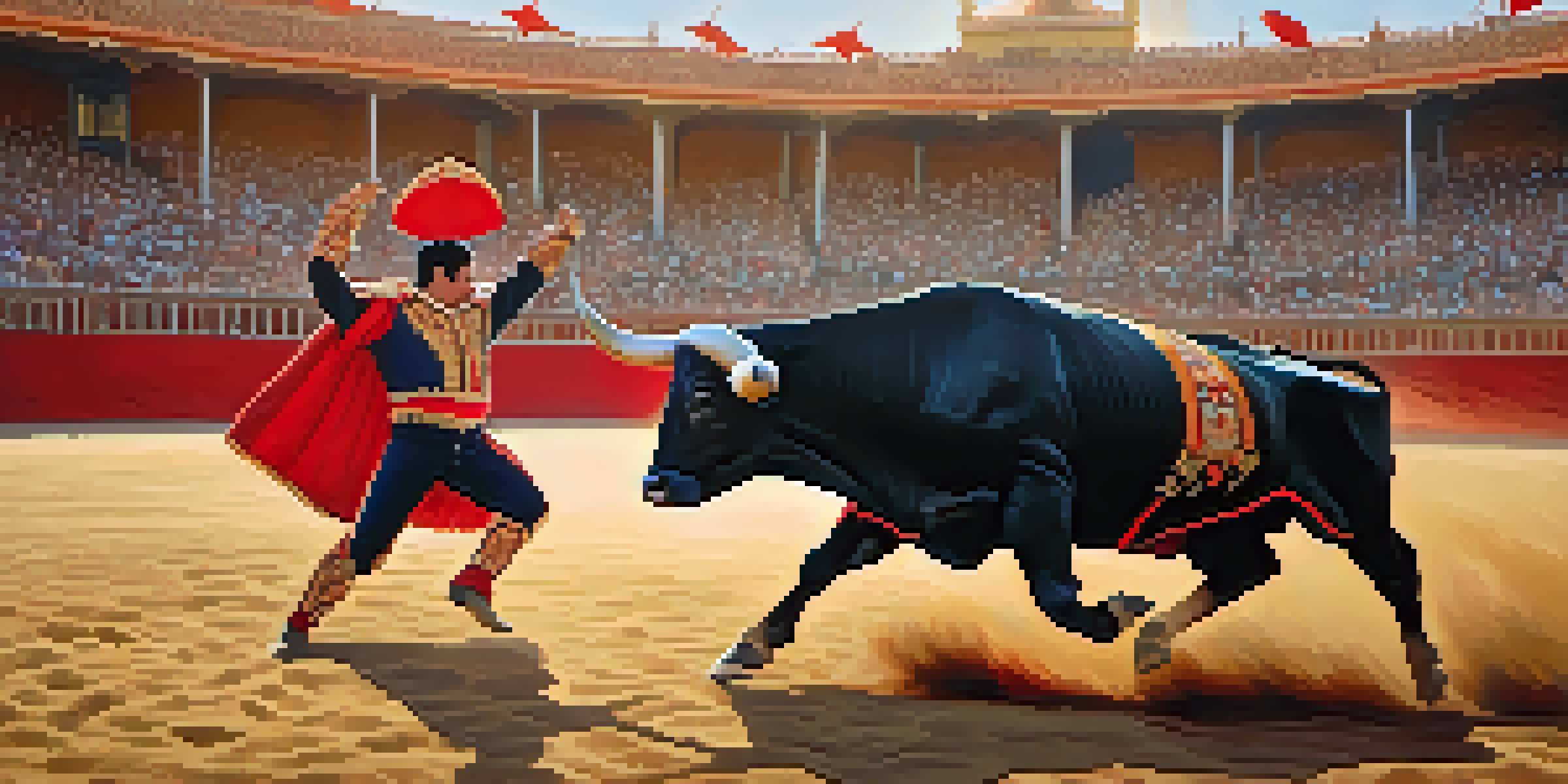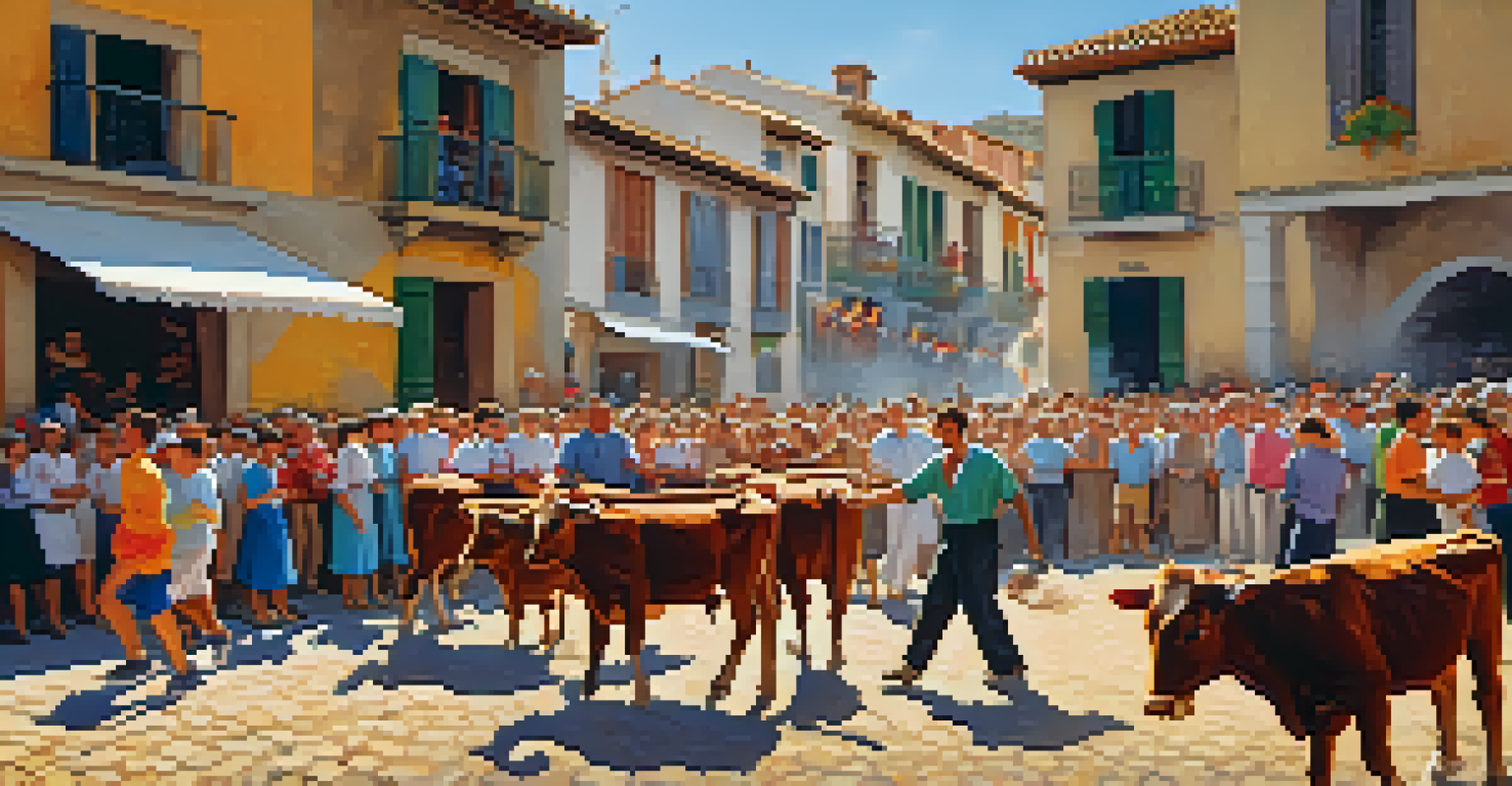Top 10 Traditional Sports Played in Spain Today

1. The Thrill of Bullfighting: A Cultural Icon
Bullfighting, known as 'corrida de toros,' is one of Spain's most iconic traditional sports. It’s not just a spectacle; it’s steeped in history and cultural significance. Each bullfight tells a story, showcasing the skill and bravery of the matador as well as the power of the bull.
Tradition is not the worship of ashes, but the preservation of fire.
Though controversial, bullfighting attracts thousands of spectators who appreciate the artistry and tradition behind the event. Many towns celebrate local bullfighting festivals, where the community comes together to honor this age-old practice. The vibrant atmosphere and passionate cheers make it an unforgettable experience.
However, opinions on bullfighting are deeply divided, with many advocating for animal rights and calling for its cessation. Despite this, it remains a significant part of Spain’s cultural heritage, reflecting the country’s complex relationship with tradition and modern values.
2. Pelota Vasca: The Fast-Paced Court Game
Pelota Vasca, or Basque pelota, is a traditional sport that combines speed and skill, often played in front of a wall. Originating in the Basque Country, this game can be played in various forms, including handball and with rackets. The objective is to hit a ball against the wall and score points based on the opponent's inability to return it.

With its lively pace and strategic gameplay, Pelota Vasca has garnered a dedicated following. Players display incredible agility and reflexes, making it an exhilarating sport to watch live. Many fans flock to local courts during festivals to cheer for their favorite teams.
Spain's Rich Sporting Traditions
Spain boasts a diverse array of traditional sports that reflect its cultural heritage and community spirit.
The sport not only serves as entertainment but also as a way to preserve Basque culture and identity. Schools across the region teach Pelota Vasca, ensuring that the tradition continues to thrive among younger generations.
3. The Unique Sport of Cesta Punta
Cesta Punta, also known as Jai Alai, is a thrilling adaptation of Pelota Vasca that features a curved basket for catching and throwing the ball. This game is recognized for its speed, with the ball often reaching over 300 km/h (186 mph), making it one of the fastest sports in the world. Cesta Punta is particularly popular in the Basque Country and has even gained international fame.
Sport is a preserver of health and a source of happiness.
Spectators are frequently captivated by the athleticism and precision displayed by the players. The ambiance in the fronton (the court) is electric, with fans cheering loudly, making every point feel monumental. The sport is often accompanied by betting, adding an extra layer of excitement for the audience.
Cesta Punta is more than just a sport; it's a celebration of Basque tradition and community spirit. Events are often held during local festivals, drawing in both locals and tourists alike, eager to witness this unique spectacle.
4. Traditional Rural Sports: A Glimpse into History
Spain's rural sports, such as 'lanzamiento de piedra' (stone throwing) and 'suelta de vaquillas' (release of calves), showcase the country's agrarian roots. These events often take place during local festivals, where communities gather to celebrate their heritage and enjoy friendly competition. Participants demonstrate strength and skill, connecting with traditions that have been passed down through generations.
These traditional sports are not just about competition; they also serve to foster community spirit and pride. The camaraderie among participants and spectators creates a festive atmosphere, reinforcing social bonds within the community. Families often come together to cheer on their loved ones, making it a highlight of the local calendar.
Soccer Unites the Nation
Fútbol is more than a game in Spain; it serves as a unifying force that brings fans together in passionate support of their teams.
As Spain continues to modernize, preserving these traditional sports is vital for maintaining cultural identity. Many towns are working to revitalize these events, ensuring that future generations can experience the richness of their heritage.
5. The Grace of Dancesport: Flamenco and More
While not a sport in the traditional sense, dancesport, especially Flamenco, plays a significant role in Spain's cultural expression. Flamenco combines dance, singing, and guitar playing into a passionate performance that captivates audiences worldwide. This art form, originating from Andalusia, is celebrated for its emotional intensity and expressive storytelling.
Many Flamenco competitions occur throughout Spain, showcasing talented dancers and musicians who keep this vibrant tradition alive. Competitors often spend years perfecting their techniques, making each performance a testament to their dedication and artistry. The atmosphere at these events is electric, with audiences often clapping and shouting in support.
In recent years, Flamenco has gained international recognition, leading to collaborations with various music and dance styles. This fusion highlights the adaptability of Spanish culture, ensuring that Flamenco remains relevant while honoring its roots.
6. Castells: A Towering Tradition of Human Towers
Castells, or human towers, are a unique and visually striking tradition originating from Catalonia. This activity involves teams, known as 'collas,' forming intricate towers by stacking people on top of one another. The construction of these towers requires immense teamwork, balance, and strength, making it a true testament to community spirit.
Local festivals often feature castell competitions, drawing large crowds who eagerly cheer on their favorite teams. The sight of a towering structure reaching impressive heights is awe-inspiring, and the sense of achievement felt by participants is palpable. Each castell is a symbol of unity and pride for the community.
Emerging Popularity of Rugby
Rugby is gaining traction in Spain, with grassroots initiatives fostering community involvement and nurturing young talent.
Castells have gained recognition as a UNESCO Intangible Cultural Heritage, highlighting their significance in preserving Catalan identity. The tradition continues to thrive, with new generations eagerly participating in this breathtaking display of human ingenuity and collaboration.
7. The Enduring Popularity of Soccer in Spain
Soccer, known as fútbol in Spain, is more than just a sport; it's a national passion that unites people across the country. With legendary clubs like FC Barcelona and Real Madrid, the sport has a fanbase that is both dedicated and passionate. Matches often feel like festivals, with supporters donning their team's colors and chanting in unison.
The excitement of La Liga, Spain's top professional league, draws millions of viewers each season. The rivalry between teams, especially during 'El Clásico,' is intense, creating an electric atmosphere that transcends the stadium. Soccer has become a significant part of Spanish culture, influencing everything from music to fashion.

Grassroots soccer programs are also thriving, with communities investing in youth development. These initiatives not only promote physical fitness but also instill values of teamwork and discipline in young players, ensuring that the love for the game continues for generations to come.
8. The Growing Popularity of Rugby in Spain
Rugby has been steadily gaining traction in Spain, with increasing interest at both amateur and professional levels. The Spanish national team, known as 'Los Leones,' has made significant strides in recent years, competing in various international tournaments. This surge in popularity is also evident in local clubs, where teams are forming and competing across the country.
Rugby's values of teamwork, respect, and discipline resonate well with Spanish culture, making it an appealing sport for many. Schools are beginning to incorporate rugby into their physical education programs, allowing children to experience the game early on. This grassroots approach is crucial for nurturing talent and fostering a love for the sport.
The sense of community within rugby clubs is strong, with players and families often forming tight-knit bonds. As rugby continues to grow, Spain is poised to become a more prominent player on the international stage, showcasing its rich sporting diversity.